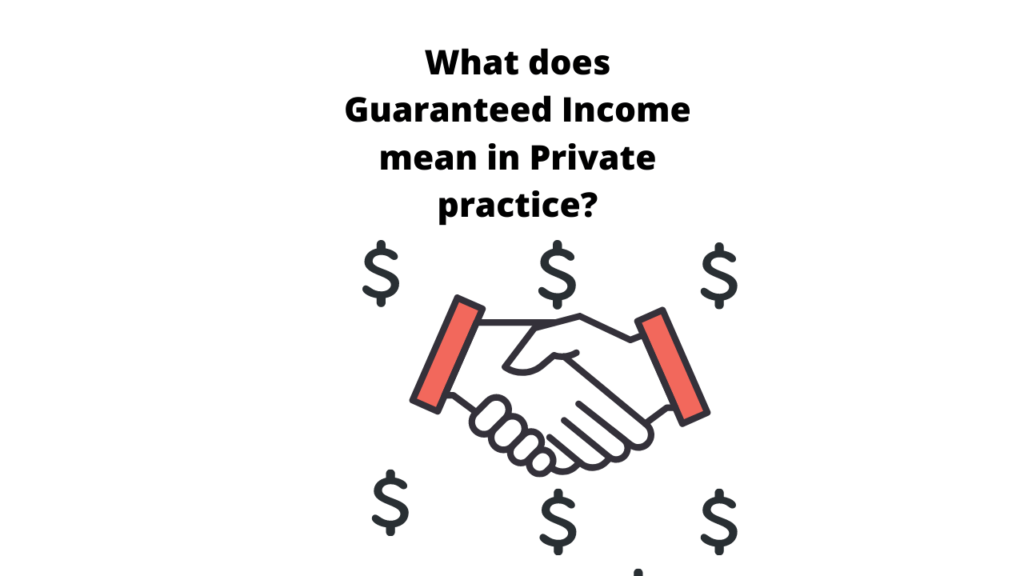
When I first started Private Practice in 1994, I moved from Hospital Sultanah Aminah (a government hospital) in Johor Bahru to Mahkota Medical Centre, a brand new hospital in Melaka. Prior to the move, I had never worked in Melaka. The move to Melaka was a bold one. Perhaps the reason I was daring enough to do that was the fact that Mahkota Medical Centre gave me a guaranteed income of RM 7600 for 1 year. This was double my government income at that time, so I gladly signed the contract.
My first month of work was tough. Being in a new hospital and the new kid on the block, I had to go out to the public to draw patients to my practice. In my first month, I did not earn the RM7600 and so the hospital topped up my income to RM 7600. Since then, I have earned more than that guaranteed income.
Later in my career, I learned that a guaranteed income given to a doctor is dependant on the presumed “value” of the doctor. For example, if a hospital desperately wants a cardiothoracic surgeon, they will give a larger guaranteed income to tempt the doctor to join the hospital. The duration of the guaranteed income can also be longer.
Providing a guaranteed income is a common method used by private hospitals to entice doctors to join them. It provides a sense of security to the doctors who are leaving government hospitals to go to private practice. The usual practice is to give a guaranteed income of 1 to 2 years. In some contracts, a “Forgiveness Period” follows the Guarantee Period. The guaranteed income is considered a loan but this loan is “forgiven” as long as the physician continues practicing in that hospital for a period of time. The Forgiveness Period can be 2 years for a 1 year guarantee or four years for a two year guarantee.
Recently, several doctors were unhappy with a certain hospital. They complained that the hospital was taking away the “top up “ money from their income when they were earning above the guaranteed income. However, upon enquiry, this was found to be untrue. Insurance companies delay payment for up to 3 months. Doctors are paid their guaranteed amount even when insurance companies have not paid the hospital. Eventually when the insurance company does pay up, the amount will be deducted from the doctors’ income as this amount had already been topped up earlier. This is a logical method followed by most hospitals.
Some hospitals are aggressive in recruiting doctors and offer high guaranteed income to lure doctors to move from one private hospital to another. Is this ethical? I guess in a market driven world, even doctors can choose where they want to work and are entitled to move if there is monetary gain offered by another hospital.
Fortunately, most doctors have pride. They don’t want to live on a guaranteed income. Most doctors will work hard to try to exceed their guaranteed income as soon as possible. They know that once the guaranteed income period is over they are on their own and have to fend for themselves and there is no more safety net called “guaranteed income” anymore.
If a doctor is found to be taking a long time to reach the guaranteed income, firstly it will reflect badly on him. If he is going to work for a long time in that hospital, living on a guaranteed income will appear uncomplimentary on his resume with the hospital. Many doctors may have a contract with the hospital and poor income may lead to termination of their contracts. So for most doctors, working hard to increase their income to exceed the guaranteed income is the only option. This is the reason why businessmen go all out to lure doctors to join them by giving attractive guaranteed income.
Another factor to consider is that the hospital will also try to help poor performing, guaranteed income doctors, to see more patients by promoting them or even sending walk in patients to them. This is to their benefit because the more patients they consult, the more their income and the less the amount the hospital has to top up. This trend has been a sore point for other resident doctors in many hospitals as they complain that patients are “siphoned off” unethically from them to these “guaranteed income” doctors.
So what advice can I give young doctors?
- If you plan to move to private practice, one cushion is to look for a hospital that gives a guaranteed income. There is no free lunch. You will ultimately be paying back your guaranteed income by the work that you do because the hospital is investing in you and hoping to reap the benefits in years to come.
- Negotiate the best-guaranteed income. The more your “value” the more you can ask. Don’t be shy to ask for more.
- Read your contract carefully as to what the guaranteed income means. Sometimes it may actually mean a soft loan whereby the money given to you to top up, may be taken away from you when you start earning more than the guaranteed income.
- You will need to work hard to earn above the guaranteed income as fast as possible because the management will be watching your performance. This will reflect on you in the future as a “non-hardworking” doctor if you are not able to reach your guaranteed income within a short period of time.
- Remember that once your guaranteed income is over, another doctor will be employed and given the same guaranteed income. You must be prepared for it.
30/11/2021






